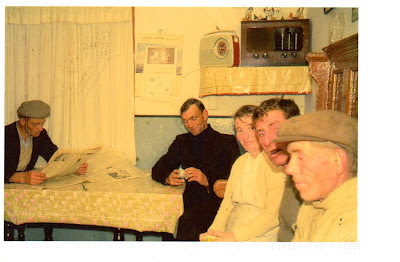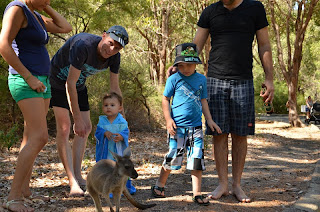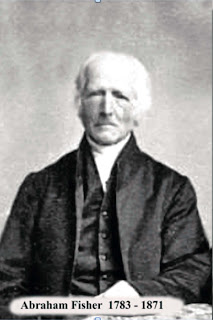 |
| An Rinn |
It is all too common nowadays in An Rinn and
elsewhere to witness farewell parties in local pubs for young people (mainly
young men) heading off to far-flung places. Australia seems to be the
destination of choice, although not exclusively so. In any event, all of these
partings set me thinking back to a time in my own (now distant) past, when I
emigrated to Canada.
 |
| Early traditional Ring Cottage |
Let me say upfront that I left Ireland more
out of choice rather than necessity. Having done the Leaving Certificate in
Meánscoil San Nioclás in 1962 and having spent a year at Pallaskenry
Agricultural College, Limerick I got a job as a “field technician” with An
Foras Talûntais (the forerunner of Teagasc) towards the end of 1963.
I thought I had it made at 7 pounds and 10 shillings a week (at the time of
joining the standard work week was five and a half days but that was soon cut
to five days). The job initially involved desk work in an office in Sandymount
Avenue in Dublin but after a time some of us were given cars (by then I had
acquired a driving license) and we were assigned to collecting data from
farmers in various parts of the country. This work was all part of a first
attempt at a comprehensive analysis of the state of farming in Ireland.
 |
| View of Murray's Pub in Ring |
The work and the travel was all very
exciting at first but by about 1967 I was getting restless and I felt that I
needed to see a bit of the world. As it happened a boarding guest appeared in
my parents home in An Rinn, who introduced himself as an academic from a
university in far off Canada with an interest in Celtic studies. We got talking
and I showed him around the countryside a bit. The result was that he promised
to assist me with gaining entry to his college in Canada if I managed to sort
out the formalities of legally emigrating to that country. This two-pronged
plan was set in motion ; I contacted the Canadian Embassy in Dublin and he
presented my Leaving Cert results to the University of Windsor in southern Ontario.
 |
| University of Windsor Campus |
In due course, success emerged on both fronts – I was cleared for emigration to
Canada and university entry was available to me. Then, of course, the real
soul-searching commenced. Was this what I really wanted? Did I want to turn my
back on family, friends and footballing team-mates? Could I even afford to
support myself through college? If I went would I ever return? These and many
other questions ran through my mind, even as the clock started to tick towards
setting a departure date.
By about April 1968 (and having turned 23
years) I had settled on mid-June for leaving – and the reality of this decision
began to hit home. Like most Irish families at the time emigration was
practically in our DNA. My father had spent from 1923 to 1932 in Boston.
My
mother had seen five of her siblings depart for the United States and she never
met three of them again. The biggest worry was my father who was by then
elderly and in poor health. I will always remember sitting with him – just the
two of us in the house - to watch the European Cup match between Manchester
United and Benfica on 29 May 1968. I knew and he knew that once I had gone in a
few weeks we would not see each other again.
 |
| Last view of Cobh |
To compound matters the United States (and
in some minds, by extension, Canada) was constantly in the news for the wrong
reasons. The Vietnam War was raging; President Lyndon Johnson announced that he
would not run again; Martin Luther King was murdered on 4 April, precipitating
riots in over a hundred cities (including Detroit, just across the river from
Windsor); Robert Kennedy was assassinated in Los Angeles on 5 June. To my
mother these were all good reasons for me not to venture next nor near
North America!
 |
| Dublin Airport c1960s |
However, I stuck to the plan and 18 June
found me at Dublin Airport, battered suitcase in tow, new passport in hand and
ready to board a plane for the first time and leave Ireland's shores, also for
the first time. There was no hiding that I was nervous and apprehensive about
the whole venture. I had arranged with a fellow called Eddie Power, whom I knew
from An Foras Talûntais and who had earlier emigrated to Montreal, to
meet me on arrival at Montreal International Airport.
I still have that old
passport, with a Canadian Immigration Identification Card dated “18 June 1968”
stapled to it. Thankfully, Eddie was at the airport and he took me to his home
in the Montreal suburb of Lachine. The plan was that I would spend a few days
with him and then take the long bus journey south to Windsor, via Toronto.
 |
| Dominion Bridge steel constructors |
Eddie introduced me to some people in the company that he worked for – Dominion
Bridge steel constructors – and I could have had a job there and then,
which would have relieved me of the fears that the 300 pounds in my pocket
would not take me very far in this country...However, I decided to follow
things through and after three or four days I was on a bus heading for Windsor.
I cannot now remember too much about that long journey except that I arrived in
Windsor bus station late at night. The man who had arranged everything for me
at the university was there to meet me and it was only then that he dropped the
bombshell – that he was in fact a Catholic priest, attached to the Order of St.
Basil. The background to this is that the University of Windsor, which was by
then under the authority of the Government of Ontario, had evolved from a
college run by the Basilians and some members of the Order, continued as
lecturers at the University during these early years of the transition.
Fr.O'Donoghue preferred not to be fussed over as a priest during his visit to
Ireland.
I spent a couple of nights in the Basilian
residence and then I moved into a flat with a lad called Bob Nemeth, who had
just graduated from the University. Bob was half-Hungarian, half-Welsh and he
is someone that I am still in contact with.
 |
| Detroit River |
The accommodation was, to say the
least, basic (as befitting students) and what I will never forget is how hot it
was during the summer months and how much dust came through the windows –
blowing across the Detroit River from the massive automobile manufacturing
plants in that neighboring U.S. city. Bob worked for a security company, run by
a number of retired policemen. The pay was the minimum wage at the time - $1.25
per hour – but there was the scope to work long hours. The city of Windsor was
and still is what in Canada would be referred to as a “blue collar” town, with
its own car assembly plants and other industries such as the Hiram Walker
distillery. The security work I started doing might involve spending long hours
guarding newly assembled cars awaiting shipment or keeping watch in a factory
at night or over the weekend. However, while the hours were flexible the pay
for this work was poor overall and I became conscious that I needed something
else during that first summer in order to be able to advance the tranche
of fees due when I started university in September.
In that respect, and through my Irish
innocence, I got lucky. Bob was away for a few days and I dropped into the
local pub or “tavern”. I got talking to a German-born electrician who had come
to Windsor from Toronto to do some work on a restaurant that was being built.
He had not yet arranged accommodation and I suggested that he could sleep on
the couch in my flat until he got sorted out. In retrospect, this was a rather
crazy thing to do but it paid off because the next day he managed to get me a
job as a general labourer on the restaurant building project – at $3.50 an
hour!
 |
| Early view of Dominion House. |
The foreman on the job was called Tony and
he was one of the many colourful characters that I was to meet during my time
in Canada. As a nationalist from one of the Baltic States he had fought on the
side of the Germans in the Second World War and he took great delight in
telling stories of battles against what he saw as the Russian oppressors. A
couple of Italians on the job got dog's abuse from Tony because of Italy's
perceived poor performance in the war. I got along well with him and he would
give me some extra work at the weekends. The only time I sailed close to the
wind was when the Warsaw Pact forces invaded Czechoslovakia on 24 August to
bring the “Prague Spring” to an end. Suggesting to Tony that the reformist
Dubcek government may have provoked this Russian-inspired intervention by
moving too far too quickly was not the smartest move on my part!
Anyway, we parted on good terms in early
September. I was able to pay the university fees with the money I had earned
and saved in the course of the summer. I was free to continue the security work
while studying, which kept me ticking over during the school year.
Even after a brief period it became clear to
me that Canadian practices were somewhat different to what I had left behind.
The law pertaining to taverns at that time reflected a somewhat puritan
attitude, especially in the Province of Ontario, to drink (and perhaps
interaction between the sexes). Each tavern had two separate sides – one for
men, where only beer was served, and the other for “Ladies and Escorts”,
serving mixed drinks and wine in addition to beer. Single men were not allowed
to sit on the latter side and, of course, women could not enter the men-only
bar. A curious situation indeed – but
then what would Canadians think of our “Holy Hour” or the concept of the
“snug”! Eventually, I learned that the two favoured drinking haunts for
students were the Dominion House and Sid's Bridge House – and lively places
they proved to be. And it was a lot more
interesting to sit on the mixed side...
Pierre Elliot Trudeau from the
French-speaking Province of Quebec had become Prime Minister of Canada in April
1968, so I had arrived in the middle of “Trudeaumania”. A decent if somewhat
conservative country was now beginning to assert itself in terms of its
historical links with Britain and the Empire/Commonwealth, and its relationship
with its powerful neighbour to the south. Canada was indeed reaching out to the
world at large under this new charismatic leader.
 |
| A young Chap from Ring in present day Australia |
What adventures awaited me thereafter are
for another day ; suffice to say that the challenges that were overcome in the
immediate months after my arrival in Canada were indeed formidable. It might be
glib to suggest that I was too busy surviving to feel homesick but that would
be untrue as it was there in the background throughout. Young people now
undertaking that same life-altering venture will undoubtedly feel the same
emotions, but at least they have the comfort of cheap and almost instant
communication with home – and the world has definitely shrunk since far-off
1968.
Abbeyside emigrant to Perth. Mark Cahill (left) with wife and Australian born son





